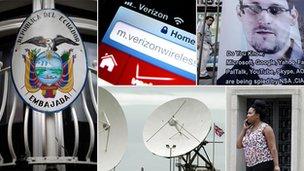Outrage is not enough for US anti-surveillance campaign
- Published
- comments

The NSA collects records of every US phone call made and received
The defeat of an attempt in the US Congress to stop the widespread collection of phone data by the US National Security Agency (NSA) is a serious reverse for those who wanted to rein in American surveillance, and it is being billed by many in Washington DC as a victory for the Obama administration.
It also prompts the question that if this proposal was defeated, despite being tabled while public unease over the revelations by former CIA contractor Edward Snowden is still running high, has his campaign to halt this blanket monitoring of communications already been thwarted?
Those who supported the proposal by congressmen Justin Amash and John Conyers to halt the collection of phone metadata - the details of numbers called and times of calls rather than their content - argue that they can take heart at the small margin of their defeat by 217 to 205 votes in the House of Representatives.
Furthermore, the American Civil Liberties Union is bringing legal action against the US government that many predict will end up testing the legality of these blanket collection programmes in front of the US Supreme Court.
It is clear then that this battle is not over, and of course it is quite possible that Mr Snowden, once he escapes his limbo in Moscow airport's transit lounge, could add further fuel to the fire with new revelations. It is now though apparent how battle lines have been drawn and that those who want the powers of the NSA trimmed have limited options.

The companies that have co-operated so fully with the NSA, for example, appear to have faced little public backlash or shareholder pressure to alter their policies.
Apple, as its last quarterly results showed, is doing very nicely, and if Microsoft recently took a tumble on the markets, nobody is connecting that with its readiness to share customer information with the US government.
Most customers for iPhones, Yahoo e-mail accounts, or Verizon cell phone contracts have not boycotted the companies. Refusing to agree to license agreements would in any case simply result in them being unable to use the goodies or services that they are after.
People are still ticking the "I agree" box. The harvesting of vast amounts of data for commercial as well as national security purposes can therefore go on - unless of course the legal system produces a judgement that stops it.
As for the foreign governments who have expressed outrage or dismay about Mr Snowden's disclosures, their options too are distinctly limited. It has been apparent since the start of this that US lawmakers, in debates such as Wednesday's, are only really interested in protecting the rights of American citizens.
We have been here before - for example when the existence of the Echelon programme was revealed in the late 1990s, external. Although there has been some debate about what the codename actually stood for, my understanding has always been that it was the computerized system that trawled communications for "selectors" such as phone numbers or names.
At the time, the Echelon revelations prompted a European parliamentary committee of inquiry and a good deal of debate about how Britain's GCHQ was helping to spy on friendly neighbouring countries in order to maintain its signal intelligence partnership with the NSA.
Yet this debate changed very little - indeed it took place shortly before 9/11 prompted the expansion of these very capabilities.
Today the Parliamentary Intelligence and Security Committee is investigating the Snowden disclosures including the existence of Tempora, GCHQ's program for capturing vast amounts of communications from the fibre optic trunks entering and leaving the UK.
However the early word from those inside the committee, is that they do not consider there has been any significant breach of the laws regulating the interception of communications or governance of the intelligence services.
The desire to re-visit those laws and examine whether they give sufficient protection to the rights of the average citizen appears to be significantly less in the UK than it is in the US.
As if to underline the limits on the ability of those outside the US to challenge these activities, Ireland's Data Protection Commissioner on Thursday threw out an attempt to stop the European arm of Facebook (which has its HQ in the Republic) transferring customer information to the NSA. Explaining its decision, the commission said US compliance with EU rules, "ticks a box under our jurisdiction".
Thus the different strands of this, from the British debate, to the continuing corporate harvesting of customer accounts, to the failure of those who wanted to check the NSA on Wednesday night in Congress all ultimately bring us back to the same place: US legal challenges and the likelihood that these issues will ultimately be argued in front of the Supreme Court.
There it will be debated in terms of legal principle rather than popular feeling - large sections of the public, as well as their elected representatives having already apparently resolved to allow blanket surveillance to continue.